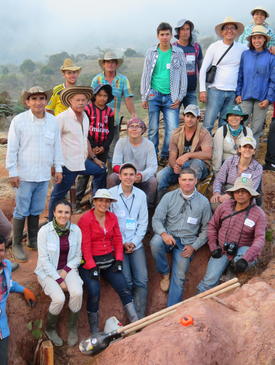Seminar and Field Course on Ecological Restoration of Eroded Lands
Summary
Reversing the negative effects of severe erosion demands creativity and the integration of several disciplines. This training event seeks to increase awareness of the complex socio-ecological issues related to erosion and to expand the knowledge of participants on the methods available for restoring eroded lands. The symposium and field course build on CIPAV’s experience in stabilizing eroded land through a combination of soil bioengineering techniques and high-density planting. This novel approach allows a fast and complete regrowth of plants in gullies and unstable slopes. An open workshop will introduce the principles and methods that guide the ecological restoration of eroded lands in the tropical Andes. Instructors will present case studies of landslide restoration and slope stabilization processes. This will be followed by a three-day field course consisting entirely of practical exercises that focus on key steps of restoration projects in highly degraded landscapes: analyzing erosion, water flows and surrounding vegetation; collecting seeds and seedlings of native plants; accelerating plant recovery through assisted natural regeneration around gullies; building biomechanical structures with wood and planting vegetation strips. Field exercises will be complemented with group discussions that illustrate a practical method for diagnosing degraded areas and designing restoration projects.
Content
Module 1: Open symposium at the main theater of the municipality of San Vicente de Chucurí (Santander, Colombia)
- Using ecological restoration to reduce risk and enhance rural livelihoods in landscapes affected by erosion and landslides
- Stabilizing eroded lands through social participation, soil bioengineering and the strategic use of native plants
- Case studies of slope stabilization and gully restoration in Colombia and Mexico
- Presentations of local experiences: community-based conservation of endangered plants, agroecological restoration at Nirvana-Clavellinas Nature Reserve and participatory research at Colnupaz school
Module 2: Field course at Nirvana-Clavellinas Nature Reserve in Zapatoca (ELTI training landscape)
- Field exercises:
- Identifying the causes of land degradation
- Designing a restoration project
- Implementing soil bioengineering structures
- Selecting, sowing and planning the spatial distribution of native plants in a restoration area
- Monitoring a restoration project


